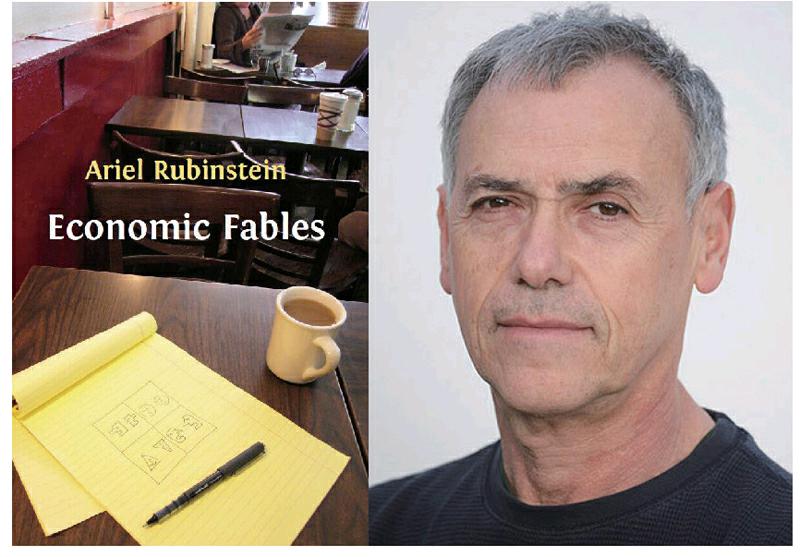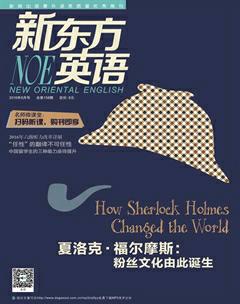句法结构与篇章语境
张满胜
传统语法教学主要把关注的焦点放在句子层面,以此来研究某个单句的结构特征,而很少探讨句子构造与篇章之间的关系。本期笔者就来简单探讨一下这个问题。
读者提问
我们先来看下面这位读者的提问:
张老师,您好!下面有一句话,我并不理解后半句。我甚至不知道是什么less,无法翻译,也无法拆分成两个简单句。
My perspective on economic models is completely subjective and describes me no less than it describes economic theory.
这句话来自图书Economic Fables (见下图)的前言介绍。该书作者阿里尔·鲁宾斯坦(Ariel Rubinstein)是特拉维夫大学和纽约大学的经济学教授,是国际上最受尊重的经济学家之一,在经济学的许多领域均有巨大贡献。在此书中,他主要强调,他用数学建立的经济模型都是很主观的,并不能用来预测人的行为,或者用来为政府服务。他对当前很多经济学家经常把自己的模型当做真理并且用于预测经济感到反感。这是一本半传记、半经济理论的书。
单句结构分析
下面笔者先来分析读者所提问的句子的构造过程,尤其是其中的less是如何使用的。我们来看一个简单的句子。
1. a. I love you more than her.
我爱你甚过爱她。
其实,这句完整的结构是:“I love you more than I love her.”由此可见,这里的her是作love的宾语。现在,我们可以把more than换成no less than。
b. I love you no less than (I love) her.
我爱你不亚于我爱她。
在a句中,我们用了more than作比较,more than的基本含义是“比……多”,相当于数学中的大于号“>”。在b句中,我们采用了no less than比较,其基本含义是“不亚于”,相当于数学中的大于等于号“≥”。由此可见,a句与b句在语义上是非常接近的。
现在我们回到本文开头的那个难句。
2. a. My perspective on economic models is completely subjective and describes me no less than it describes economic theory.
该句同样采用了no less than的比较结构。其中,主句有两个并列谓语部分is completely subjective和describes me。如果忽略is completely subjective这部分谓语,我们可以把原句改写成如下形式。
b. My perspective on economic models describes me no less than it describes economic theory.
我们会发现,这里的b句与上面例1的b句具有完全相同的句法结构:都是在no less than的前后使用了一个“主—谓—宾”句型。综上分析,我们可以把原句这样翻译。
译文1:我对经济模型的看法完全是主观的,它能反映出我是什么样的人,就如同它能够反映出我的经济理论一样。
分析至此,似乎已经大功告成了。其实不然。如果进一步透析该句,我们就能够大致推断出该句的上下文语境内容以及篇章的逻辑结构。
篇章语境
在具体讨论之前,请读者判断该句可能出现的上下文语境。
文章结构1:描述我对经济模型的看法,并讲述我童年的一些逸闻趣事→ My perspective on economic models is completely subjective and describes me no less than it describes economic theory. →描述我对经济理论的看法。
文章结构2:描述我的人生经历→ My perspective on economic models is completely subjective and describes me no less than it describes economic theory. →描述我对经济理论、经济模型的看法。
文章结构3:描述我对经济理论、经济模型的看法→ My perspective on economic models is completely subjective and describes me no less than it describes economic theory. →讲述我童年时的一些逸闻趣事。
在上述三种文章结构中,哪一种是最好的选择呢?我们根据这个句子本身的结构做出合理的推断,具体分析如下。
首先,根据英语句子的一般规律,句子主语通常是“旧信息”(given information),也就是上文已经讨论过的内容。其次,根据英文比较句的逻辑语义特点,than后面的从句是旧信息,前面的主句内容是新信息。据此,句子可以标记如下。
My perspective on economic models (旧信息) is completely subjective and describes me (新信息) no less than it describes economic theory (旧信息).
根据这个分析,我们可以把该句进一步改译。
译文2:我对经济模型的看法完全是主观的,它不仅能反映我的经济理论,而且还能反映出我的个性。
也就是说,从篇章的角度来说,本句的上文一定是在讨论economic models,而本句用来“承上启下”,引出下文将要讨论的内容describes me。据此分析,该句所在的篇章结构应该是上面的结构3。这个推论是否正确,我们只需回到原文检验即可。该句所在的上下文如下。
I am obsessively occupied with denying any interpretation contending that economic models produce conclusions of real value. I feel attracted to economics as a branch of philosophy and as an academic field in which an intelligent discussion of social arrangements is, or at least can be, conducted. But I also feel disgust for economics as an academic field that tends toward conservatism and helps the strong in society maintain their dominance, and thus serves people for whom I have little empathy.
Snow in Jerusalem
My perspective on economic models is completely subjective and describes me no less than it describes economic theory.
When I was a boy and winter came, I would peek in the morning from the window of my room at the two green trees outside and hope to see them white. I longed so much for snow that I wanted to be a meteorologist. A meteorologist, I thought, is the first to know when it is going to snow. But several nights that started with a forecast of snow— “tonight snow will fall in the hilly areas”—left me bitterly disappointed in the morning. Then several mornings that dawned with an unheralded white vista led me to the conclusion that the meteorologist was not the first to know when it would snow. Instead, it was Aryeh Mansdorf, the neighborhood grocer—he was the first to wake up and say his morning prayers before setting out to arrange the bottles of milk.
从这个语篇中可以看到,我们所讨论句子的上一段讲到了economic models,而该句的下一段在描述自己的童年经历,这就是describes me的具体内容。下文作者花了很大篇幅来回忆自己的童年经历。
从以上讨论的内容我们看到,有了精深的句法功底,我们就可以透过一个句子来管中窥豹、见微知著,从而推断出句子上下文的语境。这种功力不仅有助于我们快速阅读英文文章,把握篇章逻辑脉络,而且有助于我们在写作造句时加以应用,合理地安排句子结构与篇章结构的关系。

